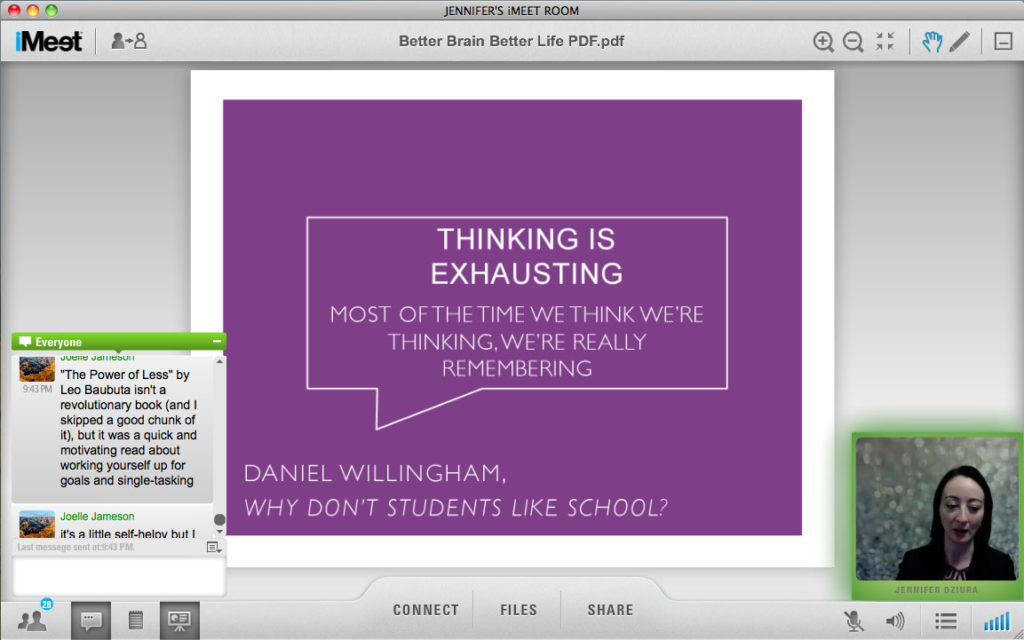Last Thursday I enjoyed Jen Dziura’s (Get Bullish) webinar “Better Brain, Better Life: Get Clear, Organized, and In Control.” We can all relate to feeling overwhelmed by the plethora of things in our lives: physical and mental and professional. Jen offers suggestions for how to manage your things and your mind for a better life:
Maybe You’re Not Actually a Lazy Procrastinator: Sometimes what you’re doing is not in line with your values. Other times there are parts of achieving your main goals that suck. For example: if you’re an artist and creating art is your goal, but you hate marketing your work. In that case, compartmentalize the work you hate, and reward yourself for doing it. Instead of doing it a little bit every day, do it once a week and treat yourself afterwards.
Do Nothing Sometimes. Reflection is mandatory for learning. With our desire to be productive constantly, we don’t leave time to stare into space while our mind makes connections. As Jen put it, “you are accomplishing something by doing nothing.”
Be Reasonable. Accept that you’re not going to do ALL THE THINGS tomorrow. Every time you expect that of yourself and inevitably fall short, it makes you feel bad. Jen reminds us that people don’t think about you that much. They just don’t. It takes a while for people to realize you’re not doing all your work. If there’s not enough time to go around, focus on the big things that will earn you recognition and advancement.
Few Skills Are Inherent. Performance comes from hard work. Whether you’re good at math, know all the world countries and capitals, or play wicked piano, it probably took effort to get good. Practice isn’t always fun, but you know what IS fun? Being very good at something. Interestingly, Jen pointed out that there is not a gender gap in math performance in other countries. The messages about math in are practice, not boys are better at math.
Distraction Is The Major Problem. Information is free. If it were humanly possible, we could all teach ourselves everything because it is informationally possible to do so (thank you, Internet). Yet people still pay for classes and teachers. Why? One, because it feels good to connect with people. Two, because we like attention and the idea that something is being tailored for us. Three, because we want someone to pare down and present us with the basics of information. We want something smaller and more clear than what the Internet offers. We want a curator.
In some cases we can pay for a curator, but in others we must curate ourselves: by doing one thing at a time, by leaving our phones in another room, by only opening a few tabs at a time.
You Need A Place to Put Information That Isn’t Your-Head-Right-Now. Some suggestions: Evernote, Instapaper, Pocket. Do you feel guilty when you don’t read every article about social inequality or productivity? Don’t. Try to remove moral judgment from not reading everything. You can’t store everything in your head, and if you’re going to read something but not doing anything about it, maybe it’s not worth your time to read it right now. Instead, schedule “reading time” every week, or save articles for reading on a beach.
How to Single Task: Jen recommends physical solutions for our tendency to get distracted. Instead of opening a new tab while waiting for a form submission, Jen dramatically lifts her hands from the keyboard: “hand’s off! I am waiting now.” This ensures that tasks are fully completed, and minimizes attempted multi-tasking (which all evidence suggests does not work).
Exercise. For Your Mind: One of my professors suggested that we need to exercise our bodies in proportion with exercising our minds. Most of our lifestyles and jobs are not conducive to this balance. Part of the problem with exercise, Jen says, is we don’t know our goals or when we’re done, which makes it hard to get started. There is a ton of evidence that exercise helps brain performance: maybe “to improve your mind” is a better goal than “to look like a certain celebrity.” So pick a thing: is it number of pushups? Amount of time spent running? Distance? Jumping jacks?
Jen’s webinars are an enjoyable blend of chatting, anecdotes, advice, and sharing resources. Want more? Here is a list of upcoming webinars.
For a great review of the webinar I missed in May, see Simplify, Declutter, Cut the Crap & Find Clarity by Jessica Says.
(photo [screenshot] by Eva Jannotta)







